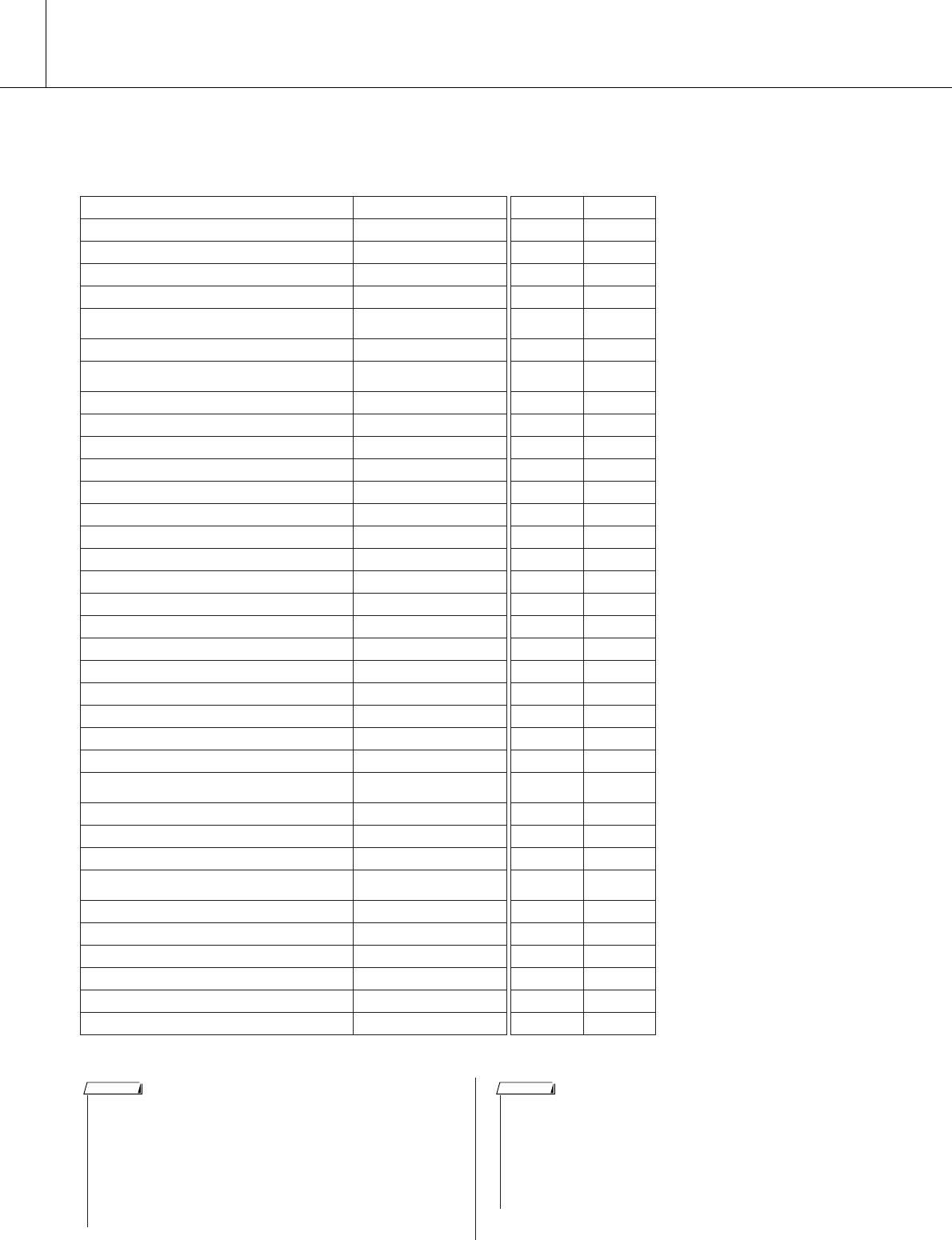
80 DGX-620/520, YPG-625/525 Owner’s Manual
Style (Auto-accompaniment) Functions
■Recognized Standard Chords● ● ● ● ● ● ● ● ● ● ● ● ● ● ● ● ● ● ● ● ● ● ● ● ● ● ● ● ● ● ● ● ● ● ●
All chords in the chart are “C-root” chords.
* These chords are not shown in the Dictionary function.
Chord Name/[Abbreviation] Normal Voicing Chord (C) Display
Major [M] 1 - 3 - 5 C
Add ninth [(9)] 1 - 2 - 3 - 5 C
9
Sixth [6] 1 - (3) - 5 - 6 C6
Sixth ninth [6(9)] 1 - 2 - 3 - (5) - 6 C6
9
*
Major seventh [M7]
1 - 3 - (5) - 7 or
1 - (3) - 5 - 7
CM7
Major seventh ninth [M7(9)] 1 - 2 - 3 - (5) - 7 CM7
9
*
Major seventh add sharp eleventh [M7(#11)]
1 - (2) - 3 - #4 - 5 - 7 or
1 - 2 - 3 - #4 - (5) - 7
CM7
#11
*
Flatted fifth [(b5)] 1 - 3 - b5C
b5
*
Major seventh flatted fifth [M7b5] 1 - 3 - b5 - 7 CM7
b5
*
Suspended fourth [sus4] 1 - 4 - 5 Csus4
Augmented [aug] 1 - 3 - #5Caug
Major seventh augmented [M7aug] 1 - (3) - #5 - 7 CM7aug *
Minor [m] 1 - b3 - 5 Cm
Minor add ninth [m(9)] 1 - 2 - b3 - 5 Cm9
Minor sixth [m6] 1 - b3 - 5 - 6 Cm6
Minor seventh [m7] 1 - b3 - (5) - b7Cm7
Minor seventh ninth [m7(9)] 1 - 2 - b3 - (5) - b7Cm7
9
Minor seventh add eleventh [m7(11)] 1 - (2) - b3 - 4 - 5 - (b7) Cm7
11
*
Minor major seventh [mM7] 1 - b3 - (5) - 7 CmM7
Minor major seventh ninth [mM7(9)] 1 - 2 - b3 - (5) - 7 CmM7
9
*
Minor seventh flatted fifth [m7b5] 1 - b3 - b5 - b7Cm7
b5
Minor major seventh flatted fifth [mM7b5] 1 - b3 - b5 - 7 CmM7
b5
*
Diminished [dim] 1 - b3 - b5Cdim
Diminished seventh [dim7] 1 - b3 - b5 - 6 Cdim7
Seventh [7]
1 - 3 - (5) - b7 or
1 - (3) - 5 - b7
C7
Seventh flatted ninth [7(b9)] 1 - b2 - 3 - (5) - b7C7
b9
Seventh add flatted thirteenth [7(b13)] 1 - 3 - 5 - b6 - b7C7
b13
Seventh ninth [7(9)] 1 - 2 - 3 - (5) - b7C7
9
Seventh add sharp eleventh [7(#11)]
1 - (2) - 3 - #4 - 5 - b7 or
1 - 2 - 3 - #4 - (5) - b7
C7
#11
Seventh add thirteenth [7(13)] 1 - 3 - (5) - 6 - b7C7
13
Seventh sharp ninth [7(#9)] 1 - #2 - 3 - (5) - b7C7
#9
Seventh flatted fifth [7b5] 1 - 3 - b5 - b7C7
b5
*
Seventh augmented [7aug] 1 - 3 - #5 - b7C7aug
Seventh suspended fourth [7sus4] 1 - 4 - (5) - b7C7sus4
Suspended second [sus2] 1 - 2 - 5 Csus2 *
C
C
(
9
)
C6
(
9
)
C6
CM7
CM7
(
9
)
CM7
(
#11
)
C
(
b5
)
CM7
(
b5
)
Csus4
Caug
CM7aug
Cm
(
9
)
Cm
Cm6
Cm7
Cm7
(
9
)
Cm7
(
11
)
CmM7
CmM7
(
9
)
Cm7
(
b5
)
CmM7
(
b5
)
Cdim
Cdim7
C7
C7
(
b9
)
C7
(
b13
)
(
9
)
C7
(
#11
)
C7
(
13
)
C7
(
#9
)
C7
C7b5
C7aug
C7sus4
Csus2
• Notes in parentheses can be omitted.
• Playing two same root keys in the adjacent octaves produces accompa-
niment based only on the root.
•A perfect fifth (1 + 5) produces accompaniment based only on the root
and fifth which can be used with both major and minor chords.
• The chord fingerings listed are all in “root” position, but other inversions
can be used—with the following exceptions: m7, m7
b
5, 6, m6, sus4,
aug, dim7, 7
b
5, 6(9), sus2.
NOTE
•Inversion of the 7sus4 and m7(11) chords are not recognized if the
notes shown in parentheses are omitted.
• The auto accompaniment will sometimes not change when related
chords are played in sequence (e.g. some minor chords followed by the
minor seventh).
•Two-note fingerings will produce a chord based on the previously played
chord.
NOTE


















